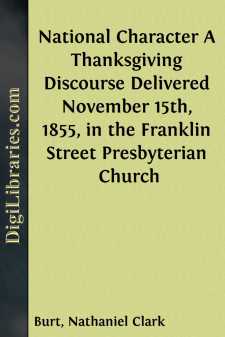Categories
- Antiques & Collectibles 13
- Architecture 36
- Art 48
- Bibles 22
- Biography & Autobiography 813
- Body, Mind & Spirit 138
- Business & Economics 28
- Children's Books 12
- Children's Fiction 9
- Computers 4
- Cooking 94
- Crafts & Hobbies 4
- Drama 346
- Education 46
- Family & Relationships 57
- Fiction 11821
- Games 19
- Gardening 17
- Health & Fitness 34
- History 1377
- House & Home 1
- Humor 147
- Juvenile Fiction 1873
- Juvenile Nonfiction 202
- Language Arts & Disciplines 88
- Law 16
- Literary Collections 686
- Literary Criticism 179
- Mathematics 13
- Medical 41
- Music 40
- Nature 179
- Non-Classifiable 1768
- Performing Arts 7
- Periodicals 1453
- Philosophy 64
- Photography 2
- Poetry 896
- Political Science 203
- Psychology 42
- Reference 154
- Religion 505
- Science 126
- Self-Help 81
- Social Science 81
- Sports & Recreation 34
- Study Aids 3
- Technology & Engineering 59
- Transportation 23
- Travel 463
- True Crime 29
National Character A Thanksgiving Discourse Delivered November 15th, 1855, in the Franklin Street Presbyterian Church
Description:
Excerpt
DISCOURSE.
Psalm 33: 12.—Blessed is the Nation whose God is the Lord.
We have met to-day, at the call of the Governor of this Commonwealth, to render thanks to the Supreme Governor of the world for his mercies granted us during the past year. Surely we have abundant cause for thanksgiving. In the present instance, our annual festival not only calls us to recognize the common bounties of God's providence most richly bestowed, but also affords a most suitable opportunity for rendering special offerings of gratitude for our happy exemption from that pestilence, which, for months just past, lifted its frowning clouds in our near horizon, and committed its devastations on our very borders,—a pestilence which, if God had permitted it to march upon our City and to do a like deadly work amidst our population, would now be exulting over as many slain victims from among us, as there are persons now assembled in all our Churches for this thanksgiving service. Let us give hearty thanks for this distinguishing sparing goodness.
Being called together by our civil authorities, and that to recognize the hand of God over us as a people, the occasion is suitable for considering the general subject of National Character, and in connection with it, the duties and destinies of our own nation.
What now, to begin at the beginning, is the proper idea of a nation? The idea is a complex one, involving, to a greater or less extent, the ideas of community of birth, community of language, occupation of the same territory, citizenship under the same government.
The word nation signifies a body of men descended from the same progenitor,—those having community of birth. We may, from the sense of the word, call the Jews a nation, though using a diversity of languages, and though scattered over the earth, without distinct territory or separate government.
Community of language commonly follows upon community of birth. Yet community of language does not of itself determine or secure nationality. The English and ourselves speak the same language, yet are distinct nations. The Swiss are one nation, yet speak some of them French, others German, others Italian.
Occupation of the same territory is not essential to nationality. Not only may a nation be scattered,—its parts dwelling in several lands,—as in the case of the Jews, but a nation may migrate in a body and preserve its national character in transit, or it may have no fixed territorial abode whatever. The Tartars and the Arabs are nations ever in motion, and held but the most loosely by any tenure of soil.
And even citizenship under the same government, does not of itself exhaust the idea of a nation. Russia may be said to include many nations under her sway.
Yet the ideas of race, language, country and government, all enter into, and with greater or less distinctness, and to a greater or less extent, constitute the general idea of a nation. The French have in general the same origin: they speak the same language: they possess a definite territory: they live under one government. They are of Gallic origin: we call their language French: their home is France: they are the subjects of Napoleon.
These several ideas of a nation do not, however, seem to be equally essential. It is in the idea of Government, the idea of the State, in which an associated body of men rises to view as a personality, and as a sovereign power, clothed with divine privileges and prerogatives, subsisting for high moral ends, dispensing justice amongst its own citizens in the name of God, and treating with other States as responsible persons like itself, with whom it dwells as in a family of nations to possess the earth;—it is in this idea that the ideas of community of origin and of language, and occupation of the same territory, merge themselves as subordinate or accidental, and that our view of a nation is most satisfactory and complete.
The functions of supreme government are rarely exercised over a very small body of men. And nations need to be of some magnitude to realize the benefits of national existence....


